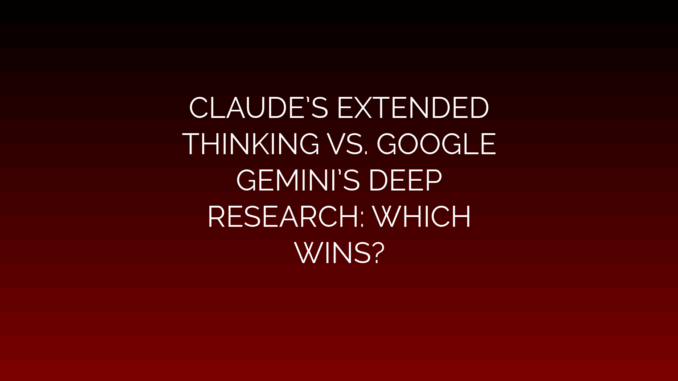
Claude’s Extended Thinking vs. Google Gemini’s Deep Research: Which Wins?
The rapid evolution of large language models (LLMs) has created distinct approaches to processing knowledge. Claude (developed by Anthropic) and Google Gemini represent two powerful philosophies for AIdriven reasoning: Claude’s extended thinking emphasizes deep conversational analysis and expansive logic chains, while Google Gemini’s deep research leverages realtime data synthesis and web connectivity for precision. This article dissects their strengths, weaknesses, and ideal use cases to determine which approach excels in practical scenarios.
Understanding Claude’s Extended Thinking
Claude’s extended thinking centers on contextual continuity and logical exploration. Instead of relying on external data fetches, it meticulously builds arguments stepbystep within long conversational threads. This approach prioritizes:
- Coherent Chain-of-Thought: Claude structures complex ideas sequentially, transforming vague queries into structured analyses by inferring underlying needs.
- Internal Knowledge Synthesis: Using its trained dataset (current up to its last training cut-off), Claude cross-references concepts to identify subtle patterns without web searches.
- Ethical Guardrails: Anthropic integrates constitutional AI principles, ensuring outputs align with safety and helpfulness guidelines.
- Memory Optimization: It excels in multi-turn dialogues, retaining context across thousands of tokens to maintain narrative consistency.
For example, when drafting a business strategy, Claude dissects market dynamics, competitor behavior, and risk factors in a selfcontained narrative flow, avoiding external distractions.
Decoding Google Gemini’s Deep Research
Google Gemini’s deep research is defined by its integration with Google’s ecosystem—including Search, Scholar, and realtime data streams. This enables:
- Real-Time Data Retrieval: Gemini pulls current information from the web, news, or academic databases to validate claims or update statistics.
- Multi-Modal Fact-Checking: It cross-references text prompts with images, charts, and maps to enhance accuracy.
- Source Verification: Gemini cites origins for key data points, lending transparency to its outputs.
- Scalable Knowledge Access: Direct indexing of Google’s search index allows it to cover niche topics needing live sources (e.g., stock prices or breaking news).
In practice, tasked with analyzing the economic impact of a policy, Gemini synthesizes reports from IMF, World Bank, and news outlets within minutes.
Comparative Analysis: Strengths and Weaknesses
| Criteria | Claude’s Extended Thinking | Google Gemini’s Deep Research | |||| | Timeliness | Relies on pretrained data; lags on current events. | Excels with realtime information via web access. | | Reasoning Depth | Superior for abstract logic, philosophy, and creative iteration. | Strong in datarich analyses and factual precision. | | Transparency | Internally consistent but lacks source citations. | Provides verifiable references, improving trustworthiness. | | Bias Handling | Constitutional AI reduces harmful outputs proactively. | Depends on web source quality; may inherit biases. |
Key Limitations
- Claude: Struggles with time-sensitive tasks (e.g., “latest AI regulations”) and lacks attribution for specialized claims.
- Gemini: Can veer into tangential details during deep dives, potentially overcomplicating solutions. Web dependency risks “hallucinations” if sources conflict.
Use Case Showdown: Where Each Excels
Choose Claude’s Extended Thinking When:
- Drafting nuanced documents (e.g., legal briefs, screenplays, ethical guidelines) requiring layered logic.
- Brainstorming sessions demanding creative leaps or hypothetical scenarios without external noise.
- Tasks needing empathetic engagement, like customer support dialogues or mental health advisories.
Opt for Google Gemini’s Deep Research When:
- Analyzing financial markets, verifying news, or compiling academic research with citations.
- Technical troubleshooting (e.g., coding errors, engineering challenges) requiring updated documentation.
- Competitive intelligence gathering or market trend forecasting reliant on fresh data.
The Future: Hybrid Approaches on the Horizon
Neither model holds a universal advantage. The next frontier involves AI agents combining extended thinking’s analytical rigor with deep research’s dynamic sourcing. Innovations like retrievalaugmented generation (RAG) already hint at this synthesis: using internal reasoning to frame queries, then validating conclusions against external databases. This hybrid model could mitigate hallucinations while preserving creative depth.
Conclusion: Context Dictates the Victor
Claude’s extended thinking wins in domains demanding narrative cohesion, ethical safety, and conceptual exploration. By contrast, Google Gemini’s deep research dominates for realtime accuracy, technical precision, and sourcebacked insights.
For enterprises and developers, the solution isn’t winnertakesall:
- Integrate Claude for innovation labs and content creation.
- Deploy Gemini for data analytics and research teams.
As both models evolve, their convergence will likely birth AI assistants that master fluid reasoning and empirical validation—reshaping how humanity solves complex problems. Until then, strategic alignment with task needs ensures optimal outcomes.
Leave a Reply